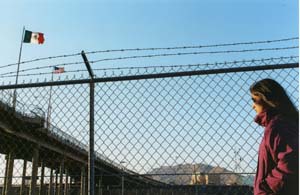
Juarez: Stages of Fear
2005, R, 87 min. Directed by César Alejandro. Starring Chris Penn, María Rebeca, César Alejandro, Elizabeth Cox, Jose Solano, Rick Bornemann, Sergio Chacon, Denise Bonilla.
REVIEWED By Marrit Ingman, Fri., Dec. 9, 2005
It’s not to every taste – and more on that in a bit – but it’s hard to argue with this cri du coeur from director-producer Alejandro, a transplanted El Pasoan who’s donating proceeds from the film’s soundtrack to charitable organizations benefiting the survivors of the kidnapped and murdered women of Juarez, Mexico: a silent epidemic of as many as 450 crimes in the last 10 years, according to the film’s intertitles. Alejandro, a native of Chihuahua who’s worked as an actor and a filmmaker on both sides of the border, has himself been kidnapped, according to the UT-Brownsville Collegian, and his film lambasts the apathy and corruption that predominates among local law enforcement. The film advances two intertwined theories: that a significant portion of the murders are being committed by a serial killer, possibly an American citizen (a modus operandi Alejandro attributes to El Paso’s FBI unit), and that the remainder are associated with the lucrative enterprise of kidnapping for ransom. You might expect a documentary approach to the subject, but Alejandro is more of a pulp-fiction storyteller. Thus the film follows an American businessman (Penn) on a pleasure trip to Juarez that turns ugly when he’s abducted by a sadistic gang. Meanwhile, an unseen driver cruises a maquiladora, following one of the young women drawn there by the promise of steady work and a possible way north, and a kidnap survivor who’s been trying to put his ordeal behind him contemplates reporting it to the Juarez police. Alejandro’s oeuvre is the low-budget actioner (Down for the Barrio), and Juarez: Stages of Fear is crafted in this tradition: swish pans, big mirrored sunglasses, florid montage, and clunky dialogue. Aside from Penn and Rebeca (who’s had a long run as a TV star in Mexico, including a stint on Simplemente María), the actors are nonprofessionals, and a few of them (such as Bornemann as a pinche-gringo corporate executive) push the film almost into camp. To be plain, this is not an exploitation movie, but its aesthetic is similar. There’s a skein of dark humor in it (largely through the device of shock-jock banter overheard on the unseen driver’s radio), and sometimes the movie feels over-the-top on purpose, but it’s too close to call. Certainly the film aspires to promote awareness of its subject, and it merits attention for this fact alone.
A note to readers: Bold and uncensored, The Austin Chronicle has been Austin’s independent news source for over 40 years, expressing the community’s political and environmental concerns and supporting its active cultural scene. Now more than ever, we need your support to continue supplying Austin with independent, free press. If real news is important to you, please consider making a donation of $5, $10 or whatever you can afford, to help keep our journalism on stands.
Josh Rosenblatt, Nov. 30, 2007
Marc Savlov, Nov. 12, 2004
Nov. 9, 2007
Juarez: Stages of Fear, César Alejandro, Chris Penn, María Rebeca, César Alejandro, Elizabeth Cox, Jose Solano, Rick Bornemann, Sergio Chacon, Denise Bonilla









